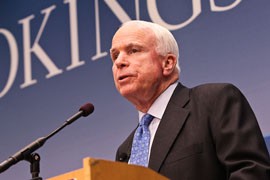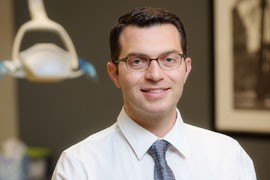Cronkite News has moved to a new home at cronkitenews.azpbs.org. Use this site to search archives from 2011 to May 2015. You can search the new site for current stories.
As McCain urges action, Syrians in Arizona keep a nervous, wary eye
WASHINGTON – Sen. John McCain, R-Ariz., told a Washington audience Thursday that the United States must establish a safe zone in Syria and arm the opposition with “heavy weapons” before the region sinks “deeper into extremism and conflict.”
But Reda Taleb thinks that would be a mistake.
Taleb is one of several Syrians in Arizona who are keeping an eye on the conflict in their homeland, and on the actions of McCain. The senator made headlines last month when he went to Syria and met with leaders of the armed opposition to the Assad regime there.
While the Syrians in Arizona are deeply divided on what action the United States should take, they are all equally passionate.
“I think that (intervention) would only bring more killing and suffering and disaster to the Syrian people,” Taleb said.
The Tucson resident believes that U.S. intervention in the Syrian civil war will only increase Islamic extremism and instability in the region. He pointed to fallout from U.S. actions against Libyan leader Moammar Gadhafi and Iraqi dictator Saddam Hussein.
“Every time we (the United States) supported a military movement, like the one that brought down Gadhafi or the one that brought down Saddam Hussein, we ended up in a country that is shattered with extreme instability and severe forms of Islam,” Taleb said.
But Zaki Lababidi said the U.S. must get involved to stop what he called “genocide” on the ground in Syria.
“This is not a civil war, this is a genocide,” Lababidi said. “You have one side that has Kalashnikovs (rifles) and the other side has a mighty army.”
Lababidi, a Scottsdale resident and member of the Syrian Support Group, hails McCain as a “champion of the Congress” for “his support of the Syrian people from the beginning.”
McCain entered Syria from Turkey on May 27 and spent several hours speaking to rebel leaders there.
In a speech Thursday at the Brookings Institution, he said the United States must take “decisive action” in Syria to help the millions of people who have risked “everything on behalf of the same values we hold dear: freedom and democracy.”
The Syrian people are “asking us to take a chance on them,” McCain said. “Not after they have succeeded in their struggles but now, when they need it most.”
McCain called it “an inescapable reality” that U.S. national security interests will suffer if growing Islamic extremism in the region is left unchecked, and he argued that intervention could “create new leverage to defuse sectarian tensions.”
“The entire Middle East is up for grabs and our enemies are fully committed to winning,” he said.
That point was echoed by Rana Dbeis, a junior at Arizona State University, who said other nations are already actively involved in Syria.
“The only thing that hinders their (the rebels) approach to toppling the regime is the fact that they lack weapons, and that’s because the regime is heavily armed by foreign countries such as Iran, Lebanon, Hezbollah and Russia,” she said.
Dbeis, a co-founder of Save Our Syrian Freedom, supports McCain’s push to arm the rebels. She believes that the lack of support from other countries is the primary reason why the rebels have not toppled the Assad regime.
In the meantime, the situation on the ground grows more chaotic, with reports of atrocities leveled at both sides.
Taleb said that while the uprising in Syria began as a democratic movement, many Syrians have distanced themselves from the rebels because of growing extremism and sectarian violence – claims that Lababidi dismisses as “nonsense.”
“There were many people in Syria who were striving for democracy and freedom and all the things we enjoy in the West,” Taleb said. But in the face of reports of atrocities and sectarian violence, he said, the situation has “totally changed.”
“I am not a supporter of Assad, but people think he is the lesser of two evils,” Taleb said.
Whatever action is taken, McCain said, it must be a long-term commitment to the entire region.
Peace will “not come through drone strikes and night raids alone, but by helping people across the region lift up democratic governments and growing economies that offer hope,” he said.









